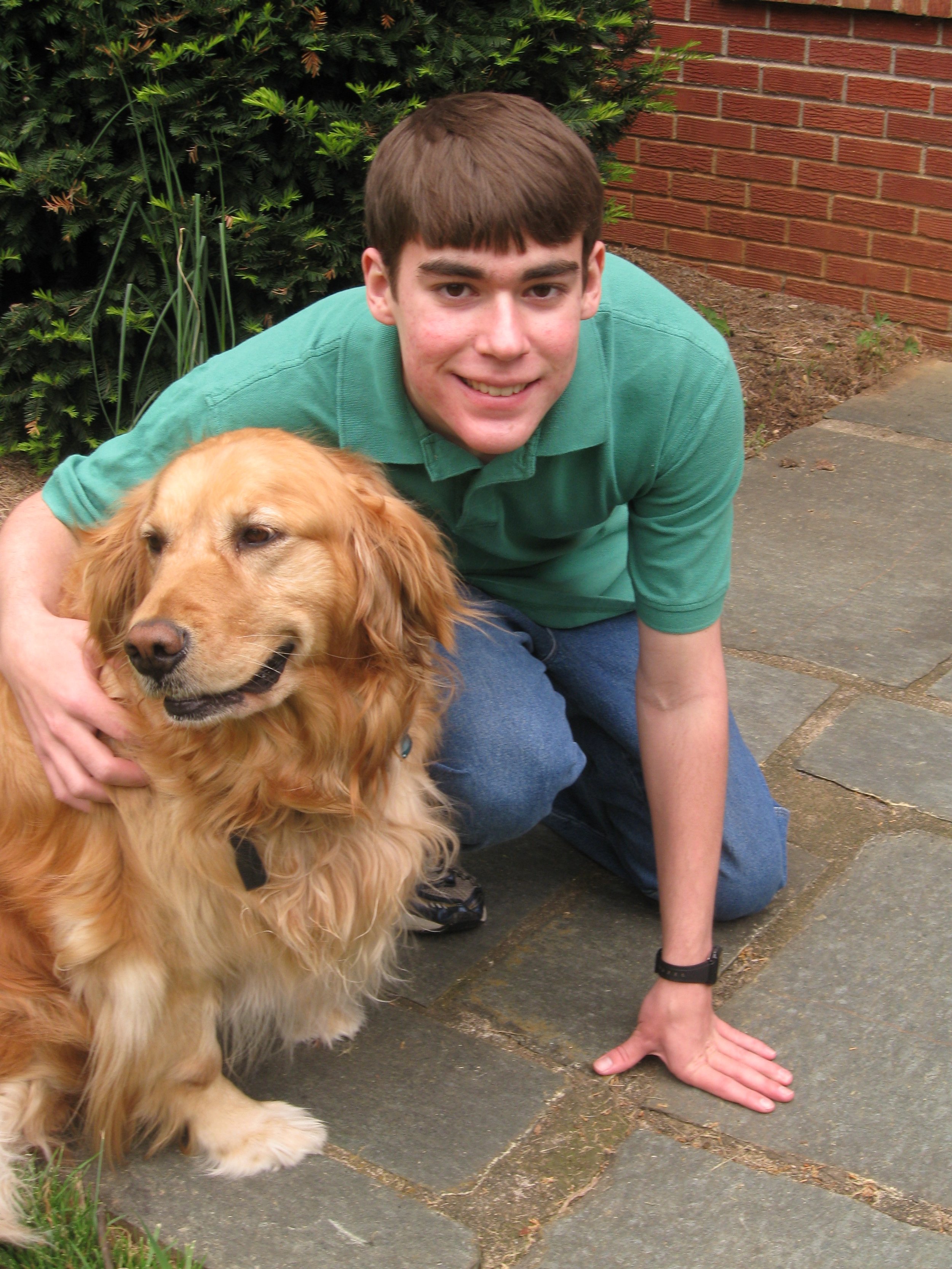Mourn With Those Who Mourn
August 24, 2023 — Laura House
You've probably heard the adage, “Dogs are man’s best friend,” and you may have experienced that friendship yourself. We have.
When our kids were growing up, we owned an eighty-five pound Golden Retriever named Annie. Actually her full name given by the kids was Analiese Josephine House, but for obvious reasons, we called her AnnieJo. I never knew that dogs could be such an important part of a family’s life, until I met Annie.
Through thick and thin, she was right there by your side. She was loyal, cheerful, caring, and fun, and if she wasn’t so huge, her real desire could have been realized…to be a lap dog. Annie could tell when one of her humans was sad, and she’d rest her head on your leg or gently place her giant paw on your arm, trying to bring comfort. And it worked. In addition to her comfort skills, she was the best listener, and she heard a lot of woes from all five of her humans who were navigating earthly life (although Gary insists he never confided in her).
When Annie passed away, to our surprise, our daughter visited the local animal shelter the following morning to just “play with the dogs.” It wasn’t long before we got a text with the cutest picture, a three-year-old special needs dog who looked like a miniature Annie. At the time, we didn’t know that Nathan would soon be in Heaven, but God knew. Megan’s little fifteen pound “Buddy” became a comforting friend to her. Through sleepless nights and days filled with the agonizing grief of losing a brother, Buddy stuck close, trying to help, obviously aware of the pain Megan was experiencing.
Buddy was a rescue who had actually been returned to the shelter three times. It didn’t take long to figure out why. He clearly had experienced abuse and was terrified of almost all people, other dogs, UPS trucks, mail carriers, and a host of other things. Because he only loved the first nine people he met after leaving the shelter, no one else could visit the house without Buddy panicking and barking incessantly. He was as sweet as he could be to the chosen nine, but scared of everyone else.
A few weeks ago, Gary and I accompanied Megan and her husband, Michael, to say goodbye to Buddy. His body was not cooperating any longer and he was in pain. Such a sad moment.
In thinking about all the joy and comfort that Annie and Buddy brought in their lifetimes, I thought of how amazing it is that God created dogs primarily for us to enjoy. There are some who are hunting dogs or guard dogs, but most are simply dogs who just want to love and be loved. Dogs can sit with their owners for endless hours and just listen, quietly offering comfort and understanding. Thinking through the qualities that most dogs possess, it seems that we humans could take a few lessons from them, especially in times of grief.
As helpful as dogs may be when their owners are struggling, human friends are what we really need when we walk through suffering. Every time I think about being a friend to someone who is grieving, I think about the Book of Job. Reading through the book, we can learn a lot about how to reach out to others. Remember Job’s friends? If you recall, three of Job’s friends came to visit him after the devastating loss of all ten of his children and all of his possessions, and after he had been struck with illness himself.
For the first seven days, his friends quietly sat beside him, grieving with him, and supporting him while he experienced the deepest sorrow he had ever known. The Bible states that their purpose was to “sympathize and comfort.” It is a beautiful picture and example for us. If you know someone who is grieving, this is the biggest gift you can give to them. Be there. Grieve with them.
I wish I could say it all went well with Job’s friends from there, but if you are familiar with the Book of Job, then you know that the comfort from his friends ended when they opened their mouths (aren’t we glad dogs can’t talk!). After seven days, they could no longer hold their tongues and began to speak of things they knew nothing of. Their words weren’t right, were hurtful, and caused Job more pain. Job’s comforters became his accusers.
Even though I am using Job’s friends as a negative example because of their inaccurate conclusions they suggested, they did do some things right that we can learn from.
First, let’s read the passage of Job 2:11-13.
Now when Job’s three friends—Eliphaz the Temanite, Bildad the Shuhite, and Zophar the Naamathite—heard about all this adversity that had come upon him, each of them came from his home, and they met together to go and sympathize with Job and comfort him.
When they lifted up their eyes from afar, they could barely recognize Job. They began to weep aloud, and each man tore his robe and threw dust in the air over his head.
Then they sat on the ground with him for seven days and seven nights, but no one spoke a word to him because they saw how intense his suffering was.
There are two things that jump out to me that these friends did right. First, they went! They took action!
“...each of them came from his home, and they met together to go and sympathize with Job and comfort him.”
If they all lived in different places, how did they hear of Job’s calamity? I’ve never thought through this before, but the disasters that Job experienced must have been big news in many places, which makes sense because of Job’s great wealth. People likely knew who he was and when catastrophe hit, word probably spread quickly.
After the three men heard about Job’s tragedy, how did they communicate with each other to make a plan to visit him? I’m not sure on this one, and none of the commentaries I’ve consulted seem to know how far apart these men lived. Today we’d just dial our cell phones, share the news, and coordinate the trip, but it must’ve been a time-consuming ordeal to make and carry out the plan to visit Job together. Obviously I don’t really know the motives of Job’s friends, but it seems that their intentions were good and that they made a sacrifice to go to try to comfort him.
Next, Job’s friends mourned with him.
They began to weep aloud, and each man tore his robe and threw dust in the air over his head.
Then they sat on the ground with him for seven days and seven nights, but no one spoke a word to him because they saw how intense his suffering was.
I think I love this part the most—the image of three men sitting next to Job, mourning deeply with him, not saying a word. If you are a bereaved parent, I suspect you’ve had moments of great appreciation for people who walked beside you during the darkest days of your life; not offering explanations, platitudes, or advice, but acknowledging your pain and expressing their sympathy and love for you.
Let’s strive to be like Job’s friends during the first week of their visit. We can GO TO and we can MOURN WITH those who are grieving.
Entering into someone else’s pain can be exhausting and painful for us as well, but it is also a deep honor, and actually an expectation and exhortation. Romans 12:15 reiterates this truth that as believers, we should, “Rejoice with those who rejoice; mourn with those who mourn.”
As we allow ourselves to enter into someone’s pain, not only does the Lord use us to bring comfort and hope, but He continues to mold and shape us into who we are becoming. And one glorious day, we will not need anyone here to console us or mourn with us, for we’ll leave this earth behind and enter into the life we are really made for. “For our citizenship is in heaven, from which also we eagerly wait for a Savior, the Lord Jesus Christ;...” Philippians 3:20


